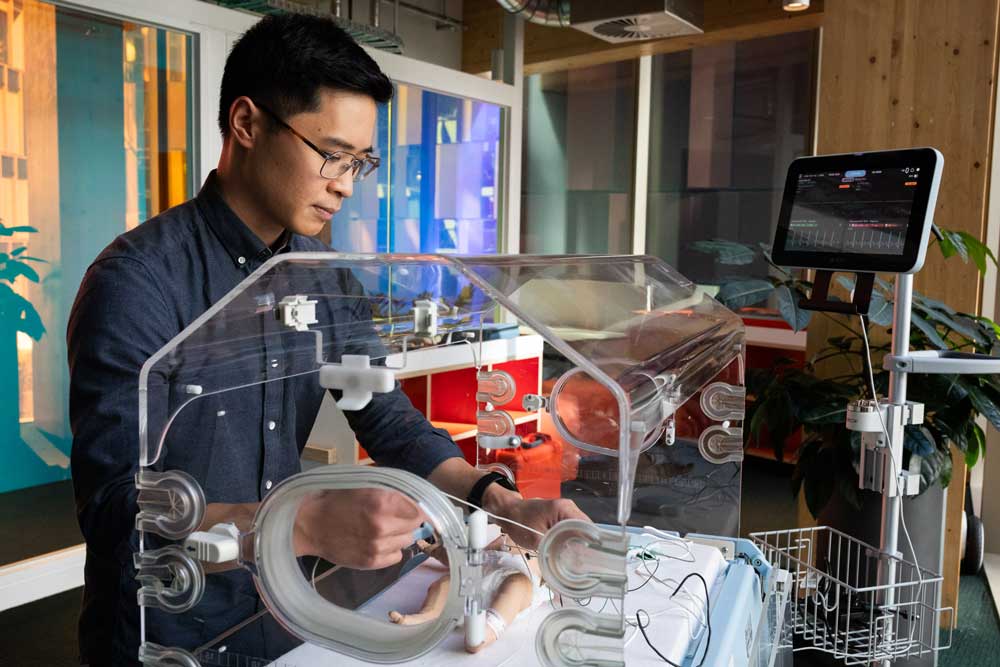Founding a company was not the path Shing thought he would take, but a subject in the Master of Biomedical Engineering sparked his journey to solving unmet clinical needs. Alongside a group of his classmates, Shing cofounded Navi, a startup company focused on delivering medical devices for neonatal and paediatric patients.
Before entering the world of clinical settings and funding rounds, Shing came to the University of Melbourne to undertake a Bachelor of Commerce. Thinking the future might involve a career in consulting or as an engineer, he majored in economics and finance and dove into the opportunities available as part of his course, as well as the broad range of extracurricular activities on offer at the University.
In addition to representing the University in tennis, Shing pursued opportunities for practical work experience. “I wanted to actually work on something with a group of people and to really apply what I learned outside of the classroom setting. So, I joined the consulting club where I met a lot of good friends and worked on a couple of really interesting projects.”
While he went on to study biomedical engineering and deepened his technical knowledge through his masters, the commercial skills from Shing’s undergraduate degree have proved invaluable in his role as Chief Operating Officer at Navi.
"Having that breadth of knowledge across commerce has definitely been helpful in running the business that we have now, while engineering has taught me to get into the details of product development."

After graduating from the Bachelor of Commerce, Shing enrolled in the Master of Biomedical Engineering and continued to engage in the many opportunities available to him, including global experiences. An exchange to Switzerland was transformative, exposing Shing to inspiring people and the work they were doing.
“An exchange was definitely out of my comfort zone. I met a lot of really interesting people from around the world and started to learn what they were doing. The second I got back from exchange, I started to look for these new opportunities and found a lot of them in Melbourne and around Australia.”
One of the pivotal moments in Shing’s journey was the Biodesign Innovation subject he undertook during his masters degree. The subject brought together students from different disciplinary backgrounds to understand and explore the medical device commercialisation pathway and ended up being the genesis of the company Shing and his friends run today.
“We came together as part of an assignment process just to learn about device commercialisation and prototyping. But it turns out that we all got along together really well, were on the same wavelength and were able to get through challenges together. By the end of this subject, we asked what if we take this further and actually start a company? It was a really organic process of initially wanting to work in a classroom assignment together, which eventually became our jobs and our life right now.”
One of the unmet clinical needs Shing and his colleagues discovered was that clinicians in neonatal intensive care units (NICUs) often face difficulties in securing catheters to deliver important drugs and nutrients to their patients.
“A clinician we met had over 30 years’ experience looking after patients, and despite best efforts, she along with her colleagues can still have difficulty with the catheter placement procedure. At the moment we’re trying to deliver this prototype to help improve procedures around the world.”
The team finds motivation in there being only a small percentage of medical devices being approved for the paediatric patient population and even fewer for newborn patients. “For us to work on an underserved market, on patients that really need it the most and to potentially change clinical practice and guidelines in the future, drives us every day.”
Reflecting on his time at the University, Shing says the ability to study across disciplines continues to help him in day-to-day life as a startup founder. “Having that breadth of knowledge across commerce has definitely been helpful in running the business that we have now, while engineering has taught me to get into the details of product development.”
As the team at Navi works towards launching their product in multiple markets, that experience may end up making a tangible impact to healthcare workers and patients in NICUs across the world.
